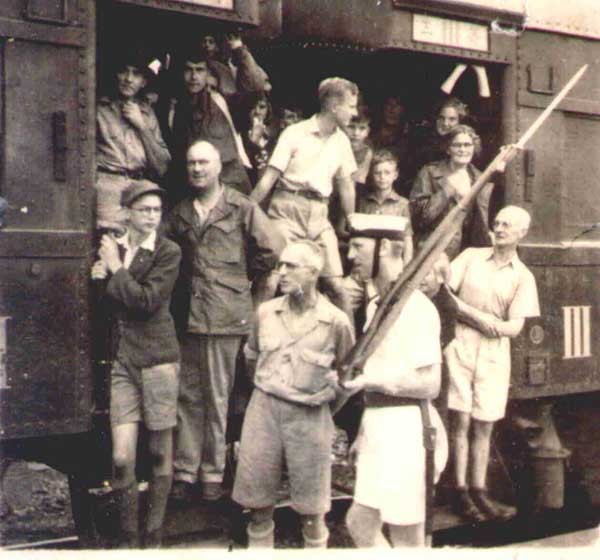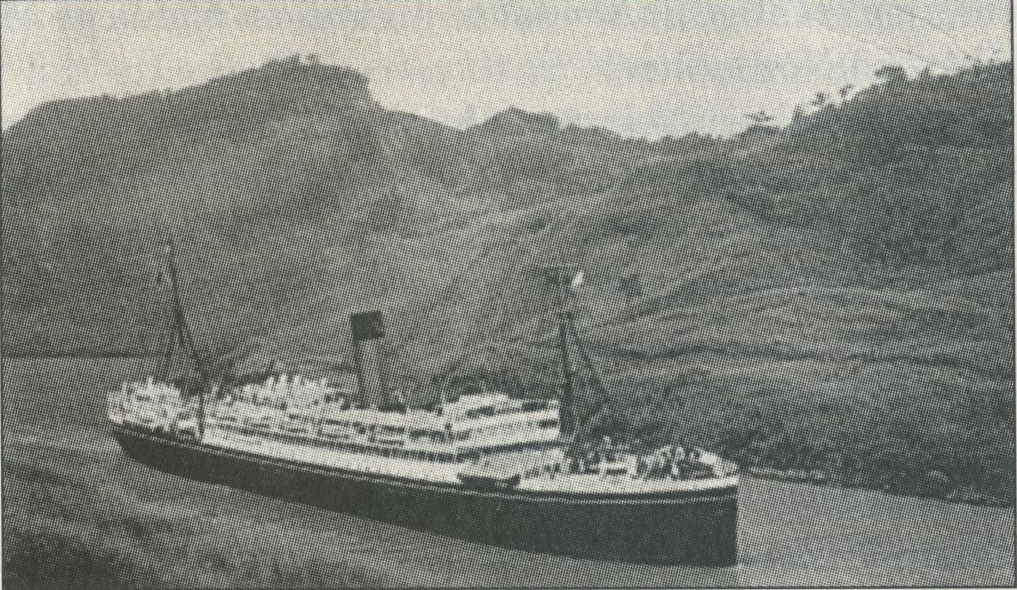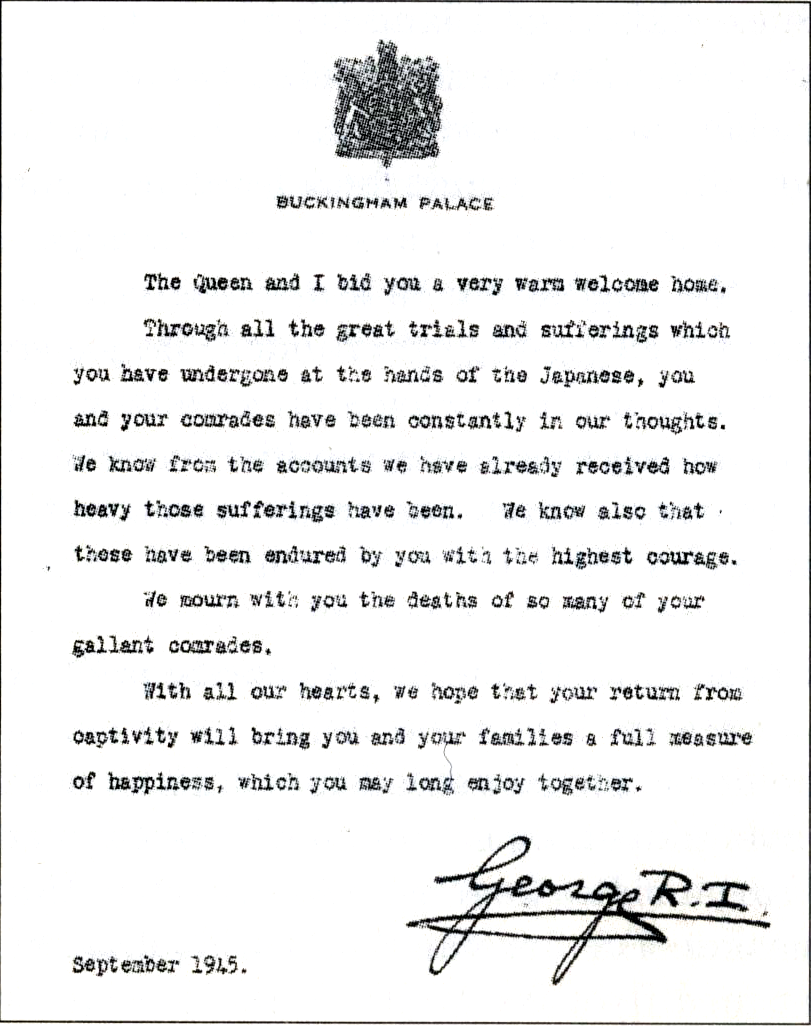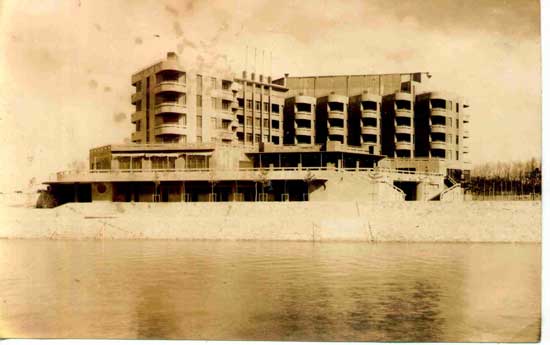Yes, as we have just heard, 13-year-old Torje experienced the situation. I have to say that my version is a little bit different.

From David Beard's chapter:
http://www.weihsien-paintings.org/DavidB/1945/p_1945.htm#02Qingdao Railway Station, Sept 25 1945'
'Following Liberation Day, Aug 17th, 1945, the American forces planned to evacuate the camp residents by rail to both Tianjin and Qingdao, but were frustrated by the constant blowing up of the railway lines and bridges by Communist forces, who were trying to stop the movement of Nationalist forces from their southern bases to the north. Special arrangements had to be made for a temporary truce to allow repairs to be made, following which a trial train with baggage was dispatched and the following day, September 25, some 600 ex-internees left for Qingdao. The following night the track was again blown up and a large bridge demolished. All subsequent evacuations were made two weeks later by relays of C-54s to Beijing and Tianjin.'
Photo shows some of the Chefoo Schools contingent: foreground- P.A. Bruce, headmaster; r. to left, Haakon Torjeson; Gordon Welch, teacher; Jimmy Bruce; Mrs Lack; Mr Chalkley,teacher.'
As I have previously told, I had been strictly instructed not to approach the gate. So when everyone ran out the gate in a frenzy of joy, Mother took me by the hand and ran with the others. The only problem was that I panicked and started howling and laughing. The only thing mother could do was take me by the arm and go back to the camp.

We never forgot the food we received in containers from the American planes.
Of course, we got to participate in the rush of joy inside the wall, and we also got our share of the goodies from the containers that had arrived with a parachute.
The victory meal that night consisted of a tomato and an apple each. It was almost too good to be true!
The next day the whole camp was dressed up in military clothes. Torje told me later that he and his friends had found chocolate in some of the containers that had cracked.
They had eaten until they passed out. Even after 50 years, chocolate was not his favourite thing. He had obviously had more than enough.
Now the allied military took over the operation of the camp, and we had enough to eat. But not until September 25 were we allowed to leave the camp. It was a victory trip by train from Weihsien to Tsingtao. All the way we were hailed as heroes. The Chinese were standing along the railway line waving and shouting at us.
Once at the coast, we were accommodated in a luxury hotel located by a white sandy beach. I have an image on my retina of large conch shells lying around on the beach.
Here we got all the food we wanted. It was almost too much. I remember being asked what I wanted on the bread slice. I was very startled and replied: "Thanks, I have butter." But it wasn't long before someone had taught me that bread with peanut butter and honey was very good.
I still think it's great. A real calorie bomb!
Here is the letter mother wrote home to her parents and sister back home in Norway:
Edgewater Mansion,
Tsingtao, Oct. 2, 1945.
Dear father, mother and Aase.
Yes, now we are finally free again after three years of captivity and can write again. It is so strange to write in Norwegian that you have to apologise for the mistakes. Hope you have received the telegram I sent last week. We don't know anything definite yet, there are all kinds of rumours, of course, but we hope that in a week or two we will be on our way home, and then maybe we can get home for Christmas. Wouldn't that be magnificent? I had hoped that perhaps we would be sent home across Canada so that I could get some clothes to come home in, but the Americans and Canadians went one way, and we go with the English another way, probably the same way!
We are here in Tsingtao's largest hotel, a lovely place with a view of the sea on three sides. There is a lovely sandy beach here where the children have a lot of fun. Can think it is wonderful to go to a set table every day, and with lots of good food. But I often think it would be better to come home directly from Weihsien. Then we wouldn't have been spoiled. Because from what we hear, you don't have much food or clothing in Norway. But we are so looking forward to coming home to you, and then God will probably take care of the rest.
I can't believe it's really true that we're on our way home.
Do you think I can get something to do when I get home?
You can keep your eyes and ears open and put in a good word for me. I worked at the hospital in Weihsien for the past few months, so I'm not completely out of practice.
It's exactly a week today since we got here, just 580 of us. There are still a thousand left up there. They sit fully packed ― poor people and just wait. But there is no room for them here until they get us off. You should have seen the welcome we received all along the railway. Downstairs it was full of people clapping and shouting cheers. And when we came here to town, we were met at the station by the English naval band, and the streets were absolutely full of people. They had been there since early in the morning, and we arrived at three o'clock in the afternoon. It was about six o'clock before we left the station, and people were still there. It's terribly difficult to think of something to write, it's been so long since I've written a letter, and then I have Astrid here, and she's a real chatterbox, and then I'm tired. The sea air and the whole change work that way. Now we're going to town and try to get a pair of shoes for Astrid, they probably cost around 2,000 dollars! The money is simply not worth anything here now. I'll try to write again, but don't expect too much from me, I'll be home soon, and then I'll tell you everything. Hope no one expects me to "preach" and talk about missionary work, because I know nothing about that, it's so terribly far back in time.
Hearty greetings to all three of you from
Inger and Lille gull.
How long we stayed at the Edgewater Mansion, I'm not quite sure. But in the end we got a place on a boat bound for Hong Kong. This trip turned out to be a bit of a nightmare. We ended up in the middle of powerful typhoons. The name of this hurricane was Typhoon Okinawa, and ten other boats went down nearby.

The troop transport ship Tamaroa brought us home from China after the war.
We arrived safely in Hong Kong and, of course, hoped to go directly from there to Norway. But it wasn't going to be that simple.
We were placed in a waiting camp for several weeks.
The time here was much longer when we just went and waited.
Every day mother was down at the harbour to find out if anyone had a place available. Every day — the same disappointing answer: unfortunately, all full.
The boats came with troops from the north, from Shanghai and the surrounding areas.
Finally, we got a place on a troop transport ship going to England. We left Hong Kong on 15 December, and Mother had little hope of making it home for Christmas. It wasn't supposed to go that way. Christmas was celebrated on board. But it was still an experience for me.
But let me take things in their proper order. We sailed through the Suez Canal, and I remember seeing caravans of camels "rolling" forward in the landscape.
When we got to Suez, we were allowed to go ashore. We were led to a large hall. Here the Red Cross had a large aid station where we were to be given clothes. Mother placed me in some form of child parking while she went around to find something that would fit. But the one who didn't want to sit passively in a children's car park, that was me. No, I could then manage myself, and help was what I was used to, so I started the round. When I found my mother again some time later, I could proudly show off a pink and white dressing gown and a lovely shoulder bag with pictures of camels on it. I thought I had been really good. I didn't think about the fact that Mother might have been scared.
Then the trip continued into the Mediterranean. On Christmas Day we were near Malta. The weather was lovely, and we children who were on board stayed out on deck. Suddenly we saw a plane circling above the ship, and then a message came over the loudspeaker that all the children had to come down to the lounge. Here we were very surprised. Because there was Santa Claus! They said he had come by plane from Malta. Can you understand me when I claimed for many years that Santa Claus lived in Malta - and not at the North Pole?
Christmas was duly celebrated on board.
Then the journey continued to England. Here we were welcomed as heroes, by the way no, not us, but the English soldiers. But we also received a welcome note from Buckingham Palace.
But then the envoy from the Norwegian embassy came.
And believe it or not: He wanted nothing to do with us.
He had only been told to accept Norwegian sailors! It was a bit of a slap in the face. But we had to land.

Also we got
welcome thanks from Buckingham Palace.
Where we lived, I have no idea. But I can remember walking along the streets of Liverpool and looking in through the windows of people celebrating the first Peace Christmas. We had to go along the streets and beg.
Suddenly one day the message we had been waiting for arrived. We were supposed to come home to Norway. Now there was no way to describe how nice everything was. We were sent to Newcastle, and there we boarded a Fred. Olsen boat that was going to Oslo.
We were assigned a cabin in first class. There were two rooms, and for the first time in my life I was to sleep in my own room. My very first outburst when we opened the door to the cabin really says it all: "Look Mummy, white sheets!" Think, white sheets!
Everything I had previously seen had been gray or brown.
Here, too, we had an uneasy trip. There was a full storm in the North Sea. I can remember the adults talking about how it was a good table and chairs were bolted on! When mother and I came up for breakfast the first morning, we were all alone. All passengers were in berths. I had a hard time understanding how anyone could not eat when there was so much goodness!
When we sailed into Oslo Harbour, we had taken up a position next to the gangway. We had sent a telegram, so those at home knew we were coming. But otherwise the uncertainty was great. Mother hadn't heard from home since 1944, so she didn't know if the parents were even alive.
She sees her mother alone on the wharf and has an apprehensive feeling.
Father then? Was he dead?
Suddenly she looks aft on the deck, and there she sees her father coming towards her with his arms outstretched. They fell on each other's necks and wept bitterly.
Adults were now weird. Here we had talked about and looked forward to coming home, and then they cried! We should be happy.
No one had ever told me about tears of joy.
But how had Grandpa come on board? We hadn't even docked! I probably told you at the very beginning that my grandfather was a customs officer. By virtue of this, he had come on board with other customs officials far out in the Oslo Fjord, and now we were finally together.
When we got ashore, mother and grandfather disappeared off to arrange the suitcases, while I was placed in a huge coil of rope. Grandma strolled back and forth, looking at her little grandson. I only spoke English and she didn't know a single word of English. So we just looked at each other and could smile at each other. I remember her from that day as a little, white-haired old lady, dressed in black.
She looked kind.
When everything was arranged, I think we had an overnight stay in Oslo before we went to Vestbanen to take the train home to Grimstad.
It was in those days that there were hard wooden benches, and the passengers sat back to back. It was January 1946, it was cold and it was snowing.
I was wearing a suit that my mother had tried in vain to lengthen with knitted purl borders. It probably reached far up my arm and to the middle of my calf. On my legs I wore clogs (described earlier), I didn't want to wear anything else.
The trip down went well. When we got to Nordagutu, grandfather, mother and I went out onto the platform to play in the snow.
Snow was something completely new to me. Grandma sat in the compartment and looked at us through the window. She heard a fellow passenger comment: "Look at that poor child, look how thin she is." Just like that, it was probably not so easy for a grandmother to hear about her only grandchild at that time.
When we arrived at Grimstad station, we were met by my aunt Aase. She took me by the arm and must have been startled by how light I was. I remember that some time later she told mother that it was weird to bathe me. She was almost afraid I was going to break. I was so thin that my ribs could be used as a xylophone, they said.
When we got home to grandma and grandpa at the customs booth, I remember that there was still a big Christmas tree between the windows in the living room. It stands for me as the world's most beautiful Christmas tree.
Not long after we got home, I got whooping cough. The disease took a huge toll on my already emaciated body. So when summer was approaching, I was sent to the countryside to Toskardal in Landvik to fatten up.
There on the farm they baked their own bread and made butter, and I was told that the holes in the bread slices were there for me to fill them with butter.
I didn't let myself be asked twice. The very best thing I knew was to get a tablespoon of butter that I could enjoy.
One of the first things that had to be arranged after we got home was some proper clothes. Now Grandfather's discarded uniforms came in handy. The seamstress was obtained, and then it was just a matter of getting started. The very first Norwegian words I learned were the following: "Turn around!" I guess I heard that quite often when we were going to try on the seamstress.
Grandpa gave me a great bag, even though Christmas was long over. I was so proud of my bag. One day mother and I had been to the baker at Bergshaven and came out of the shop, the bag was gone. I cried and was deeply unhappy.
"I thought me and my spark should live happily ever after!" was my comment. The bag was later found by the police, and happiness was restored.
All this winter and spring I was invited to birthday parties for half of Grimstad. So when my 6th birthday came up on June 14th, it was a huge party. I remember my grandmother had set the table on the veranda and made huge multi-tiered cakes. We must remember here that this was just after the war, and no one was used to such food. Therefore, the children provided themselves with a little too much, and many overate.
One of the guests was asked when she got home how things had been in the company. The answer was: "It was sooooo much fun, everyone was nauseous, and three threw up!" In other words — the peak of happiness!

I was chosen to give flowers to the Crown Prince Olav when he came to
Grimstad.
In August 1947 I started at Grimstad primary school. In the spring of 1948, I was told that we were two girls in first class who had lost their father during the war. The two of us were chosen to present Crown Prince Olav with flowers when he came to unveil the memorial to the fallen. It was a great experience.
#







